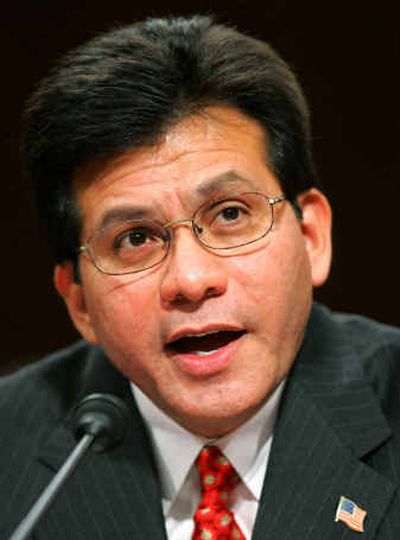Gonzales repudiates torture use

WASHINGTON – Alberto Gonzales repudiated the use of torture at his hearing to be attorney general Thursday, but several senators chastised him for helping to permit the harsh interrogation of detainees in the war on terrorism.
Gonzales also asserted that a president has the authority to sidestep laws and treaties and authorize torture in the future, though he downplayed that possibility as “hypothetical.”
During a daylong grilling by the Senate Judiciary Committee that was contentious but polite, Gonzales calmly defended his role as President Bush’s White House counsel and adviser. A fiercely loyal confidant of Bush from Texas, Gonzales is expected to be confirmed as the nation’s first Hispanic attorney general, to replace John Ashcroft.
Gonzales said he was ready for that transition: “I will no longer represent only the White House, I will represent the United States and its people. I understand the differences between the two roles.”
Several senators, including one Republican, criticized Gonzales for a series of memos in 2002 that he either authored or asked for that deprived some prisoners of Geneva Convention protections and sought to shield U.S. officials legally for using coercive interrogation tactics.
Several senators said those policies created confusion in the military, contributed to the Abu Ghraib prison scandal and other abuses and seriously weakened U.S. standing in the world.
“I do believe we have lost our way,” said Sen. Lindsey Graham, R-S.C., a former military prosecutor. He called the prison camp at the U.S. naval base at Cuba’s Guantanamo Bay “legal chaos” and warned that bad policies were “putting our troops in jeopardy.”
But Graham also said Gonzales, a former Texas Supreme Court justice, was a good lawyer and that he planned to vote for him. No members of the committee said they’d oppose him, and the only Hispanic Democrat in the Senate, Ken Salazar of Colorado, warmly introduced him to the committee.
Referring to the Abu Ghraib prisoner abuses, Gonzales promised: “Torture and abuse will not be tolerated by this administration, and I commit to you that, if confirmed, I will ensure that the Department of Justice aggressively pursues those responsible for such abhorrent actions.”
But he didn’t back away from his 2002 memo that helped persuade Bush to withhold Geneva Convention protections from Taliban and al Qaeda fighters captured in Afghanistan. And he said he didn’t disagree with some of the legal arguments in another memo that year narrowly defining torture and giving U.S. forces wide latitude in how they treated captives.
Gonzales told senators the administration was “absolutely committed” to treating all prisoners humanely and investigating any abuses. He cited eight investigations after Abu Ghraib and court-martial trials of those involved in the scandal, and denied any connection between the 2002 memos and later abuses.
When Sen. Richard Durbin, D-Ill., asked whether “U.S. personnel can engage in torture in any circumstances,” the White House counsel hesitated.
“I don’t believe so,” he said, citing anti-torture laws and the Uniform Code of Military Justice, which prohibits abusing prisoners.
Sen. Arlen Specter, R-Pa., the new committee chairman, asked a series of questions about torture, and Gonzales denounced the practice. When Specter asked whether he condemned “similar techniques” at Guantanamo, however, Gonzales paused.
“I’m not sure which specific techniques you’re referring to, but there is a range of conduct that would be in clear violation of our legal obligations,” he said.